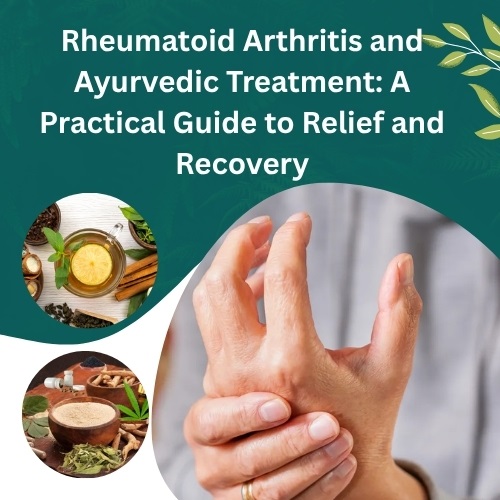Rheumatoid arthritis (RA) is a long-term inflammatory condition that affects the joints, often causing pain, stiffness, swelling, and reduced mobility. While modern medicine offers a variety of pharmaceutical treatments, many people living with RA seek complementary approaches to manage symptoms and improve quality of life. One of the most respected and time-tested alternatives is Ayurvedic treatment for rheumatoid arthritis.
Ayurveda, an ancient Indian system of medicine, offers a holistic approach to health and healing. Its focus on balancing body, mind, and spirit makes it particularly appealing to those dealing with chronic illnesses like RA. How Ayurvedic therapies, herbal remedies, and Lifetyle adjustments can support your health alongside conventional treatment.
Understanding Rheumatoid Arthritis Through the Ayurvedic Lens
In Ayurveda, rheumatoid arthritis is commonly linked to a condition called “Amavata”, which is caused by the accumulation of toxins (ama) and imbalance of the Vata dosha. According to this perspective, poor digestion leads to toxic build-up, which then lodges in the joints, causing pain and inflammation.
The aim of rheumatoid arthritis ayurvedic treatment is to remove ama, restore digestive fire (agni), and balance the doshas—particularly Vata. This multifaceted approach focuses not just on symptom relief, but on addressing root causes.
Related Article: Effective Ayurvedic Treatment for Arthritis: Natural Relief That Works
Key Principles of Ayurvedic Treatment for Rheumatoid Arthritis
1. Detoxification (Shodhana Therapy)
One of the first steps involves cleansing the body of accumulated toxins. This may include:
- Panchakarma: A five-step purification process involving therapeutic vomiting, purgation, enema, nasal cleansing, and bloodletting (when needed).
- Abhyanga: A full-body massage using warm medicated oils to stimulate circulation and remove toxins.
- Swedana: Herbal steam therapy to open pores and flush out toxins through sweating.
These therapies are usually performed under the guidance of an experienced Ayurvedic practitioner.
2. Herbal Remedies
Herbs play a major role in rheumatoid arthritis treatment in Ayurvedic practice. These are used to reduce inflammation, strengthen immunity, and support joint health.
Some commonly recommended herbs include:
- Guggulu (Commiphora mukul): Known for its anti-inflammatory and detoxifying properties.
- Ashwagandha (Withania somnifera): Supports immune health and reduces stress-related inflammation.
- Turmeric (Curcuma longa): Contains curcumin, a natural anti-inflammatory compound.
- Shallaki (Boswellia serrata): Helps reduce joint swelling and pain.
- Triphala: A gentle herbal formula to improve digestion and aid in toxin elimination.
These herbs can be taken in powder, capsule, or decoction form, depending on individual needs.
Related Article: How to Treat Arthritis in Hands Effectively: Practical Solutions That Work
3. Dietary Guidance
Food plays a central role in Ayurveda. A person suffering from RA is advised to follow a diet that strengthens digestion and reduces toxin formation.
Key Ayurvedic dietary recommendations include:
- Warm, freshly prepared meals
- Easily digestible foods like soups, stews, and porridge
- Use of anti-inflammatory spices like ginger, cumin, coriander, turmeric, and fennel
- Avoidance of processed, cold, and greasy foods
- Drinking warm water throughout the day to aid digestion
In addition, certain incompatible food combinations—such as dairy with meat or fruit with milk—are discouraged in Ayurveda, as these may hinder digestion and promote toxin build-up.
4. Lifestyle Adjustments
Ayurvedic treatment extends beyond herbs and diet. It places equal emphasis on daily habits and routines. For rheumatoid arthritis, gentle physical activity and stress management are especially important.
- Yoga: Specific asanas can improve flexibility, circulation, and pain tolerance. Poses like Tadasana, Trikonasana, and Bhujangasana may be beneficial under professional guidance.
- Meditation and Pranayama: Breathwork and meditation reduce stress, which is known to aggravate inflammatory conditions.
- Routine: Following a regular schedule for eating, sleeping, and physical activity can help maintain doshic balance.
This personalised approach to treatment supports both symptom management and long-term wellbeing.
Related Article: Arthritis in Hands: Early Symptoms You Shouldn’t Ignore
Common Ayurvedic Formulations for RA
Practitioners often recommend classical Ayurvedic formulations that have stood the test of time. These include:
- Yograj Guggulu: Often used to treat joint pain and inflammation.
- Simhanad Guggulu: Especially used for autoimmune joint diseases.
- Maharasnadi Kwath: A herbal decoction for musculoskeletal complaints.
- Rasnasaptak Kwath: Known to relieve stiffness and swelling in joints.
Each formula contains a blend of herbs specifically chosen to reduce symptoms and balance the doshas. Always consult a qualified practitioner before starting any formulation.
Related Article: Joint Support: Natural Joint Supplement for Arthritis Joint Relief Review
Safety and Effectiveness of Ayurvedic Treatments
People often ask whether Ayurvedic treatments are effective or safe. Clinical studies are increasingly supporting the use of Ayurvedic herbs in inflammatory conditions. For example, research has shown that Boswellia serrata and curcumin can reduce pain and swelling in patients with RA, offering relief with fewer side effects compared to some NSAIDs.
That said, rheumatoid arthritis and Ayurvedic treatment must be approached responsibly. Not all products are regulated, and incorrect use may lead to interactions with prescribed medications. Consulting both your GP and an Ayurvedic specialist ensures a safe, integrated care plan.
Related Article: How Rheumatoid Arthritis Affects the Hands and What You Can Do About It
Integrating Ayurveda with Conventional Medicine
In the UK, many patients are choosing to combine Ayurvedic practices with conventional RA treatment. This approach is sometimes called “integrative medicine.” While methotrexate, biologics, or steroids may still be necessary for disease control, adding Ayurvedic therapies can:
- Improve digestion and energy levels
- Ease side effects of pharmaceutical drugs
- Help reduce long-term inflammation
- Support mental wellbeing
It’s important to inform your rheumatologist if you’re using Ayurvedic treatments so they can monitor any potential interactions or adjustments needed.
Related Article: How to Relieve Arthritis Pain in Hands Naturally and Effectively
Choosing the Right Practitioner in the UK
If you’re considering rheumatoid arthritis ayurvedic treatment, choose your practitioner carefully. Look for therapists who:
- Are registered with professional bodies such as the Ayurvedic Professionals Association (APA) in the UK
- Have recognised training and clinical experience
- Use high-quality, properly labelled herbal products
- Provide treatments based on individual constitution (Prakriti) and current state (Vikriti)
Avoid over-the-counter solutions without proper guidance, especially if you’re managing a chronic illness.
A Realistic View: What to Expect
Ayurveda does not promise a cure, but it can offer significant relief. Patients who commit to regular detoxification, consistent herbal use, dietary discipline, and mindful living often report:
- Reduced joint pain and stiffness
- Better mobility
- Fewer flare-ups
- Improved digestion
- A more stable emotional state
These results typically appear over weeks or months rather than days. Patience and consistency are key.
Related Article: Best Joint Supplements of 2025, West Virginia – Herbal Care Products
Final Thoughts
Choosing rheumatoid arthritis treatment in Ayurvedic medicine can be a helpful step in managing this chronic condition. With its blend of natural remedies, therapeutic procedures, and lifestyle guidance, Ayurveda aims to restore balance to the whole body—not just the affected joints.
Whether you’re just exploring your options or already working with a specialist, integrating Ayurvedic principles into your daily life may offer comfort, relief, and a greater sense of control over your condition.
If you’re interested in learning more about related natural options, you can also explore our dedicated article on rheumatoid arthritis and ayurvedic treatment to gain deeper insight into effective routines and case-based approaches.





